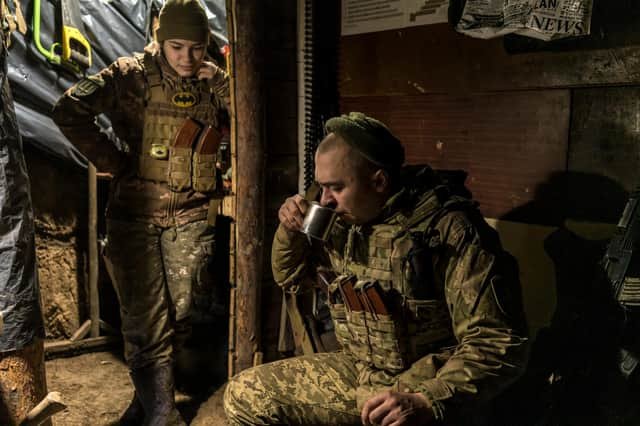Russian invasion of Ukraine would spark sanctions from West, but will they actually work? – Andrew Howie


He last spoke of the order in December 2020. It was originally imposed in 2014, an act of retaliation for European Union and US sanctions imposed on Russia after it annexed Ukraine’s Crimea region.
The ban halved Scotland’s direct exports to Russia, which were worth about £45 million annually. Some £22m of Scotland’s direct exports, consisting mostly of fish and seafood products (£16m) and dairy and eggs (almost £4m), have been lost. Alcohol was not included in the ban.
Advertisement
Hide AdAdvertisement
Hide AdNow, with warnings of far-reaching sanctions from the West in response to Russia’s massive build-up of troops and artillery near the Ukrainian border, international trade is once again a diplomatic gunboat, steering in the roughest of seas.
On the one hand, the UK, EU and US already have a package of sanctions against Russia. When the foreign ministers of the G7 group of rich democracies met in Liverpool earlier this month, they made it abundantly clear these could be ratcheted up.
The resulting communique reaffirmed the G7’s “unwavering commitment to Ukraine’s sovereignty and territorial integrity” and pointed out that “Russia should be in no doubt that further military aggression against Ukraine would have massive consequences and severe cost in response”.
As the year draws to a close, US President Joe Biden has threatened to impose “economic consequences like none he’s [Putin] ever seen”. These are thought to include limiting Russia’s ability to convert roubles into western currencies, pushing Russia out of the Swift payments system, restricting its sovereign debt purchases and encouraging Germany to halt the Nord Stream 2 oil pipeline that will bring gas from Russia directly to Europe.
On the other hand, Russia is the 11th largest economy in the world by GDP and the 25th largest services export market for the UK.
To this day, the Department for International Trade’s website reminds us that the UK and Russia are long-standing trade and investment partners, with bilateral trade to the value of £12 billion in 2021, according to the Office for National Statistics. Many UK companies have a presence in Russia, from major corporations to smaller businesses with sales, marketing and manufacturing operations in the country and a strong retail presence.
Scholars have long debated whether economic sanctions work – and whom they actually touch. The impacts are most likely to be felt by ordinary people or, as the BBC diplomatic correspondent Jonathan Marcus, puts it, “the ruled, rather than the rulers”.
There’s a belief that trade is actually one of the best ways of keeping the peace. Some of the most heartfelt objections to Brexit, for instance, were based around the idea that trading partnerships have brought stability to the continent after a century that scarred by two world wars.
Advertisement
Hide AdAdvertisement
Hide AdIn a truly globalised economy, where technology, culture and innovation easily transcend national borders, there’s a confidence that no two counties with McDonald’s on their territory could ever be so at odds that war would break out.
After Russia’s annexation of Crimea in 2014, the US imposed travel bans, asset freezes, finance and trade restrictions and much more besides. There is no way of knowing what would have happened without these sanctions.
It’s also abundantly clear that the international community has to react in some way to register protest when one of its members acts outside international law. Yet the sanctions as they stand have not resolved the Ukraine crisis.
Looking for precedent, it has been argued that sanctions against the South African apartheid state had only a modest impact – and what actually dismantled the system in 1990 was the consistent pressure brought to bear on the regime by a highly mobilised black-led coalition. Reaching further back, the US trade and travel embargo on Cuba lasted for more than five decades without achieving American policy objectives.
We also know that, for every action, there is a reaction – and the possibility of unexpected consequences. This December marked the 80th anniversary of the Japan’s blitzkrieg in South East Asia, where its forces seized the rich oil fields of the Dutch East Indies and Borneo in the same spasm of violence that included an attack on the US base at Pearl Harbor. Long-standing western oil embargos had proved to be the final straw for Japan’s militaristic, expansionist regime.
There’s a view that narrowly targeted and clearly defined sanctions are usually more effective than broad sanctions that aim, for example, at regime change.
During the Cold War, for instance, the US and the rest of the West maintained severe technology sanctions on the Soviet Union, which kept the country technologically backward. It has also been argued that targeted sanctions helped to bring Iran to the negotiating table in 2015 and to agree to scale back its nuclear activities.
The world is holding its breath over the fate of Ukraine and, given the havoc wreaked by the Covid pandemic, it seems extraordinary that this issue has apparently come back to vex us.
Advertisement
Hide AdAdvertisement
Hide AdThe hope is the threat of more powerful sanctions will be taken seriously. It’s not just Scotland’s salmon farmers and mackerel fisherman who will be ending the year thinking that what the world needs now is diplomacy of the highest order to talk all parties down from the edge.
Andrew Howie is managing partner of Grant Thornton in Scotland and the firm’s UK head of international
A message from the Editor:
Thank you for reading this article. We're more reliant on your support than ever as the shift in consumer habits brought about by coronavirus impacts our advertisers.
If you haven't already, please consider supporting our trusted, fact-checked journalism by taking out a digital subscription.
Comments
Want to join the conversation? Please or to comment on this article.
